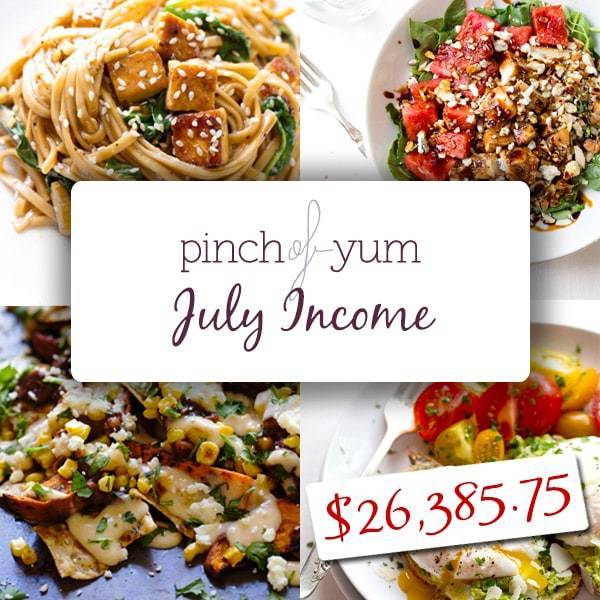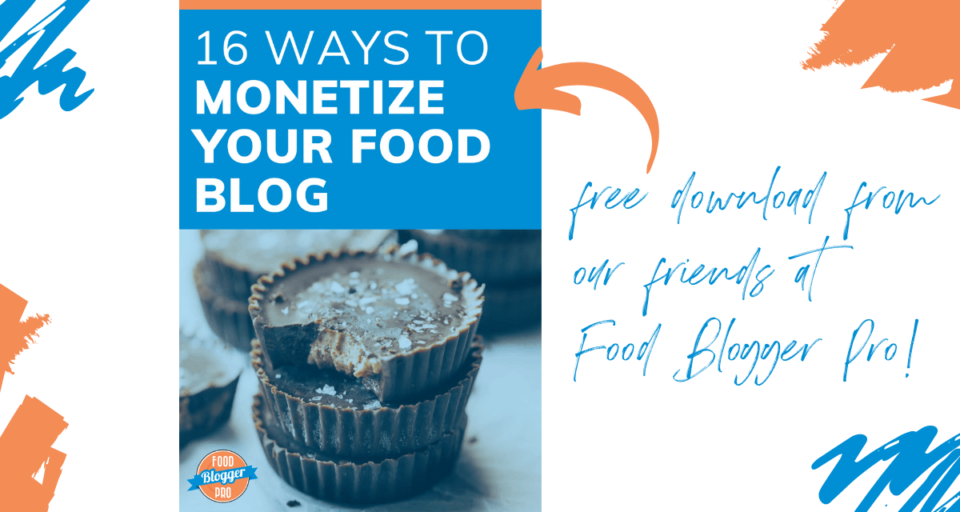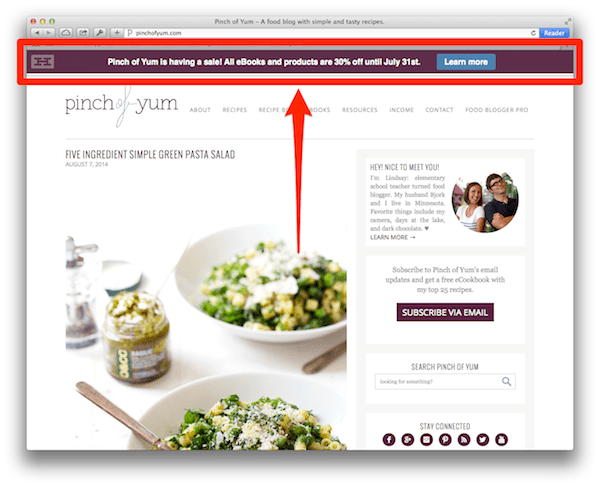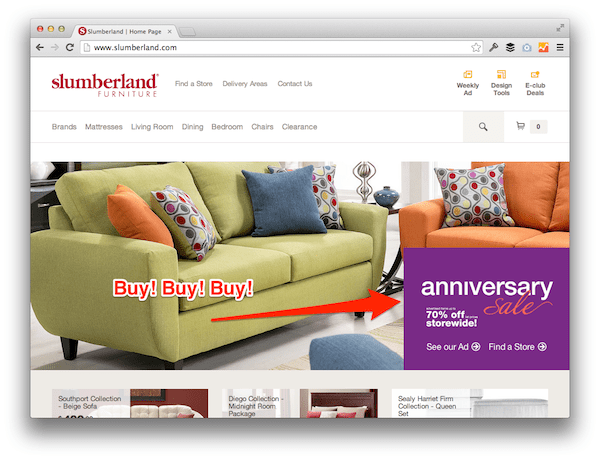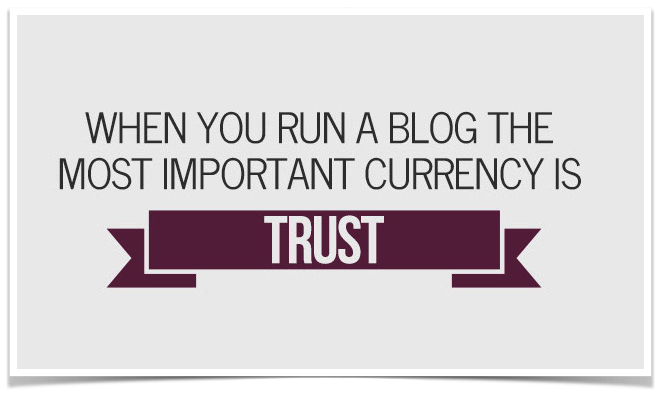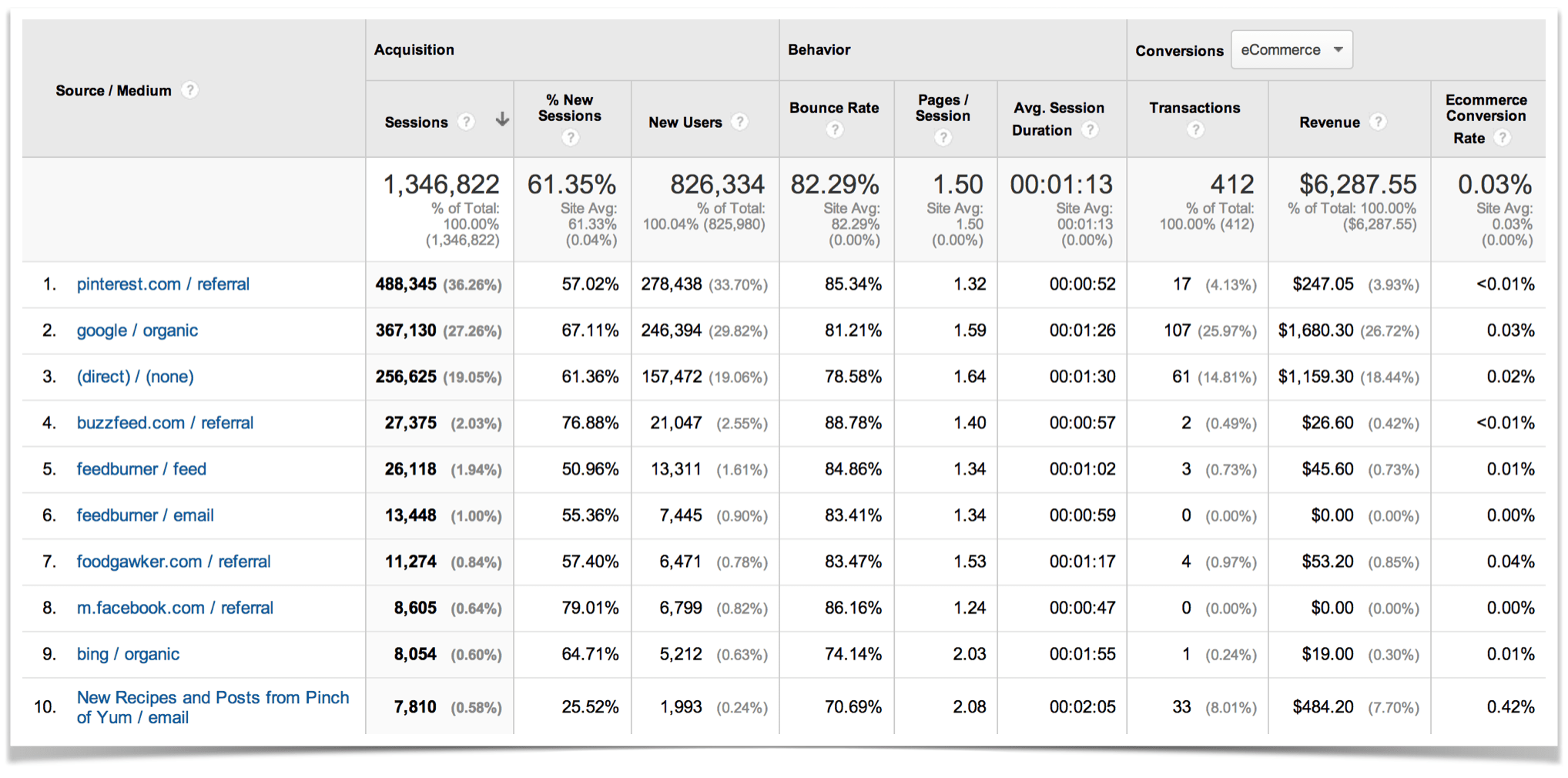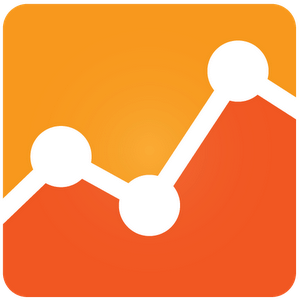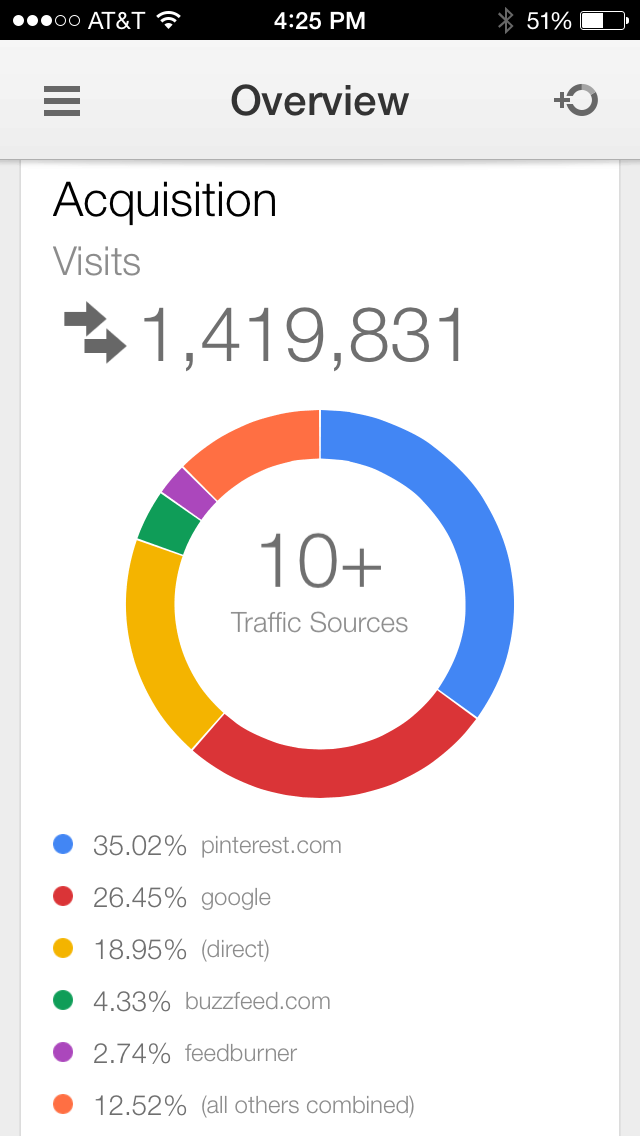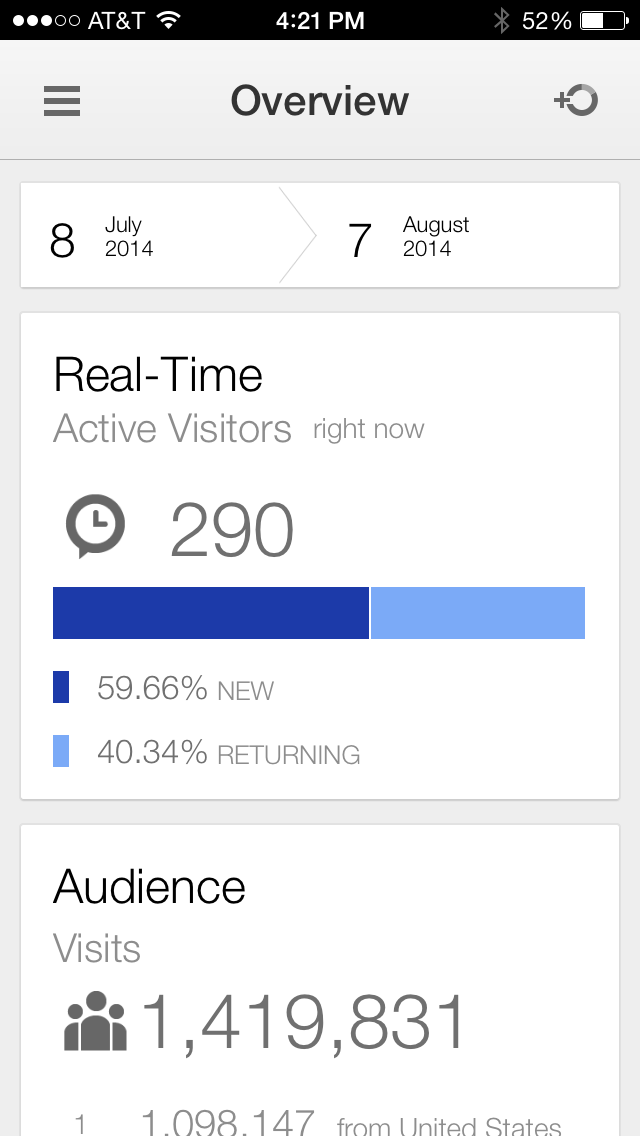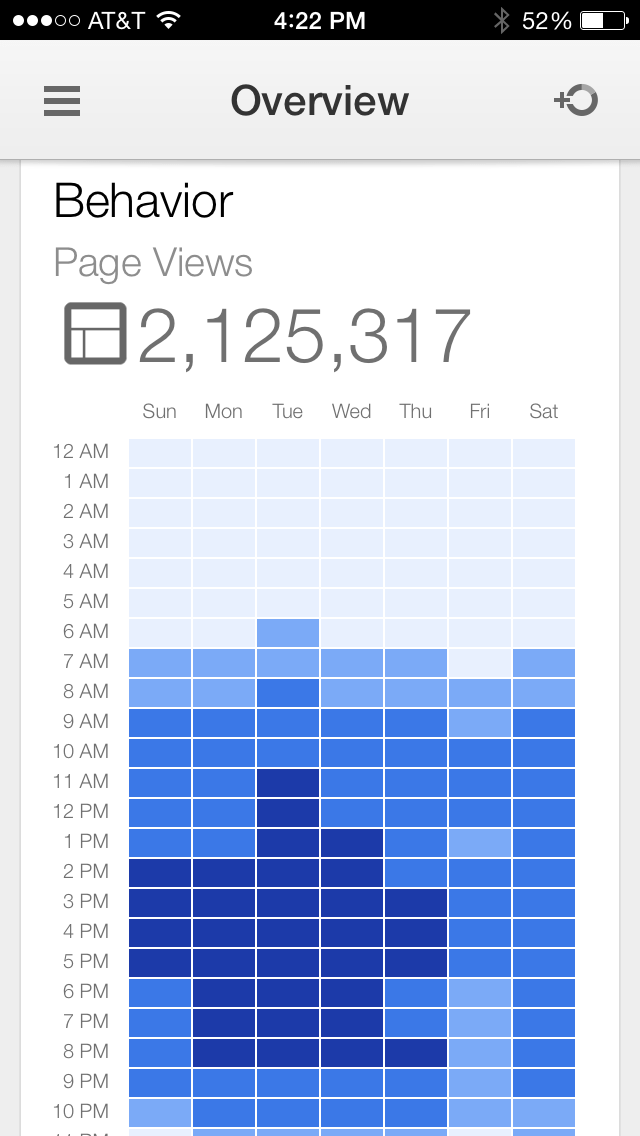Bjork here, sending you greetings from St. Paul, MN! Fun fact: St. Paul was originally known as Pig’s Eye. Too bad that’s not still the case, huh? Wouldn’t it be awesome to address a letter to Pig’s Eye, MN? Lindsay and I were both born and raised in Minnesota. High school sweethearts, as a matter of fact! So what am I doing writing a post on Lindsay’s blog? Well, other than provide some fun facts about St. Paul, I also provide a sneak peek into what’s happening behind the scenes at Pinch of Yum. You can check out last month’s post if you want to hear the story of why we started doing these reports. Here’s a quick explanation of why we continue to do these every month: Regarding that last point: I want to be intentional to point out the fact that while it’s 100% possible to build a blog and create an income, it’s 0% easy. It takes an incredible amount of hard work, dedication, learning, and even a little bit of luck. Keep in mind – there are two people working on Pinch of Yum and Food Blogger Pro. Pinch of Yum is Lindsay’s full-time job and a part-time job for me (along with Food Blogger Pro). We point a lot of our resources (both time and money) into these websites and we’ve been doing so for almost five years now. What I’m trying to say is this: don’t be too hard on yourself if you’re still in the “figuring this thing out” stage of your blog. We were in that stage for a long time. In many ways, we’re still in that stage. What’s the best way to move through the “figuring this thing out” stage? Enjoy the process. Set realistic goals. Learn something new every day. Don’t expect perfection. Make small improvements. Celebrate your little victories. Let’s take a look at the numbers for July. A quick note: Some of the links below are affiliate links. All of the products listed below are products and services we’ve used before. If you have any questions about any of the income or expenses you can leave a comment and I’ll do my best to reply.
Income
Tasty Food Photography – $7,243.45Bluehost – $4,945 –> this income comes from a page where we show people how to start a food blog in three steps.BlogHer (now SheKnows) – $4,405.01sovrn – $3,368.19Go Sugar Free Course – $3,019.73Sponsored Posts/Speaking – $1,400Yellow Hammer Media – $1,256.17Ziplist – $1,171.84Swoop (via BlogHer) – $939.71Gourmet Ads – $784.34Everyday Healthy eCookbook – $684.90Google AdSense – $641.49Genesis Theme – $630.00Say Media – $511.65The Creamy Cauliflower Sauce eCookbook – $487.80How to Monetize Your Food Blog eBook – $227.50SkimLinks – $111.84Elegant Themes – $99.00Thesis Theme – $65.01AWeber – $17.10
Total Income: $32,009.73
Expenses
Total Expenses: $5,623.98 Total Income: $26,385.75 If you’re interested in learning more about some of the ways that you can monetize a food blog, we encourage you to download this free ebook, “16 Ways to Monetize Your Food Blog,” from our sister site, Food Blogger Pro!
Thoughts On Income
Tasty Food Photography
Lindsay’s eBook, Tasty Food Photography, was the big winner for July. If you’ve read any of the past income reports you know that we’re big fans of creating your own product. Why? Because having your own product gives you control of: All three of these things played into Tasty Food Photography’s success for the month of July. Let’s take a look at each one:
1. Pricing
It sounds obvious, but when you have your own products you can set your own prices. Want to sell your product for $29? No problem. Want to add a bonus offer during a certain time of the year? You can do it. Want to have a sale at the end of the month? Go for it. At the end of July, we had a short sale where we offered 30% off of Pinch of Yum and Food Blogger Pro products. The discount code was shared in Lindsay’s post on taking the perfect pour shot and in a Google Hangout On Air on food photography that Lindsay participated in (and if you want to check out the video of that, it’s included in the perfect pour shot post). We also created a Hello Bar notification at the top of the blog to notify readers of the sale: I’ve noticed an interesting trend when we’ve run sales like this for both Food Blogger Pro and Pinch of Yum. See if you can notice the pattern in these two screenshots: Food Blogger Pro sale from November 2013 Tasty Food Photography sale from July 2014 Do you see the trend? There is a huge spike in sales on the last day. The graphs above help explain why certain companies are running sales all. the. time. For example, think of your local furniture store. Got it? Now open a new browser window and go to their website. Are they having a sale? My guess would be yes, and I’d also guess that the sale is for “this weekend only.” Or maybe more appropriately put: “THIS! WEEKEND! ONLY!” Why do they do this? Because it works. It creates a sense of urgency and people feel like if they don’t buy it THIS WEEKEND! then they’ll never again have a chance to get a deal that good. So why not run sales all the time when you’re selling your own product on your blog? Because blogging is different than furniture sales. What? You knew that already? Okay, you’re right. That’s kind of obvious. Let me rephrase that statement to make it less obvious: Because online currency is different than offline currency. When you run a furniture store, the most important currency is cash. When you run a blog, the most important currency is trust. Last winter we bought a new couch to complete our sofa set (you can see the incomplete set in this post if you’re looking for a visual). After finding the right color and size we advanced to the next (dreaded) stage of the purchase process: negotiation. I asked the sales person if it was possible to get a discount. She said that the couch is priced at the lowest possible price. I asked again. She said it’s already on sale. I asked again. She said she’d have to call her manager to get an exception (and asked me to please not tell anyone about it, because she was bending the rules for us). She stepped away from her desk, maybe or maybe not called her manager, and then came back and let us know that she convinced her manager to give us a better discount. Have you ever been in a situation like that? Did you trust that salesperson more or less after the conversation? If you’re advertising something as a certain price but you’re always discounting that product in order to get more sales, then people won’t trust that you’re telling the truth about your price. Your cash account might get a little bit bigger, but your trust account shrinks a little bit. And the trust account is the one that’s most important as a blogger. So how to do you combat that? Make sure that your price is your price and a sale is a sale, and in all transactions think first about how it will impact your trust account, not your cash account. Sales have a time and a place – just make sure that you don’t abuse it and sacrifice the trust of your readers. With Pinch of Yum and Food Blogger Pro, we aim for running a sale about once a quarter, but it usually ends up being even less frequent than that.
2. Advertising
We don’t have an advertising budget for any Pinch of Yum ebooks, but we do pay for advertising. How does that work, you ask? We only pay for advertising after a product is sold, never before it’s sold. We can do this because of affiliate marketing. This was one of the factors that played into the higher number for Tasty Food Photography in the month of July. A Tasty Food Photography affiliate who has a popular blog promoted the eBook to her audience during July, which resulted in an increase in the sales numbers. We split this income 50/50 with the affiliate, but because we always pay after a sale occurs, we never have to worry about spending more on advertising than we make back in product sales. It’s a win-win! The affiliate earns an income based on how many books they sell and we sell more product because the affiliate promoted it. Creating your own product that has an affiliate program is a great way to create an income for your blog, especially if you’re looking to earn an income when you’re just getting started. If you want to learn more about using affiliate marketing to help sell a product, check out this post on the FBP blog.
3. The Sales Page
When you have your own product you have control over all of the steps in the sales process, including the sales page. This was an element that had a huge impact on the overall success of Tasty Food Photography in the month of July, as our new sales page performed way better than the old one. The image below shows a Google Analytics screenshot. These stats are comparing the old sales page to the new sales page. The important thing to note is the last column called Page Value. The average page value for the old sales page was $0.17 per visit. After updating to the new sales page that increased to $.52 per visit. I assume that the sale at the end of July helped to bump that number up a bit, but it’s still confirmation that the new sales page is performing much better than the old one. Check out last month’s report if you want to see screenshots of all the updates we made to the sales page and explanations as to why we made them.
Tablespoons, Measuring Cups, and Buckets
A concept that Lindsay and I have been thinking about this month is the idea of the tablespoons, measuring cups, and buckets of food blog monetization. Imagine that you are trying to fill a pool with water. Your goal is to fill it completely in one year. You have the choice between using tablespoons, measuring cups, or buckets. Which would you rather use? Probably a bucket, right? But what if I told you that you had to wait six months before you could start using the bucket, and three months before you could start using the measuring cups? Is your best choice the tablespoons? You have to ask yourself a similar question when you think about how you’re going to create an income from your food blog. The pool represents the potential earnings from your blog, and the tablespoons, measuring cups, and buckets are how you earn that income.
1. Tablespoons
Tablespoons are your free content. This blog post is a tablespoon. A podcast is a tablespoon. An email update is a tablespoon. The wonderful thing about tablespoons is you can start using them right away, and while it’s possible to create an income from tablespoons (through the use of ads), the reality is that it takes a lot of them to fill the pool. This is the only tool that most bloggers use to fill the pool. There’s nothing wrong with this, it’s just important for new bloggers to understand that it takes a long time until you’re able to fill the pool using only tablespoons.
2. Measuring Cups
Measuring cups are products that you create (or sometimes products that you promote via affiliate marketing). Measuring cups are in the $5 – $99 dollar price range. Tasty Food Photography is a measuring cup. The how to start a food blog page is a measuring cup. Everyday Healthy is a measuring cup. Food Blogger Pro is a measuring cup. It’s much easier to fill the pool with measuring cups, but implementing measuring cups on your blog means that you have to either: In other words, building a measuring cup requires you to stretch yourself above and beyond your already maxed out schedule in order to find time to create a product. This is why so few people end up implementing measuring cups in their effort to fill the pool. Again… this is totally okay. It’s not bad if you don’t create a product or implement some type of affiliate product promotion on your blog. But as you ponder the idea I’d challenge you to take the “15 minutes a day” approach. Block out 15 minutes a day and work on something valuable that you can eventually offer to your readers. I think you’ll be surprised at how far you’ll get if you just dedicate a little bit of time every day.
3. Buckets
Buckets are high-end products or services. Buckets land in the $100 – $1,000 price range. You’ll usually see these as information-based products, but it’s also possible for a bucket to be a service you offer. The closest thing to a bucket that we offer is a yearly membership to Food Blogger Pro, but in actuality, we don’t have a “real” bucket. The awesome thing about buckets is that you don’t need that many in order to fill up the pool. If you have a $500 product, all it takes is 10 sales a month to make a really good income. We’d have to sell 263 copies of Tasty Food Photography in order to get to the same level! The pool will still get filled, we’re just doing it using lots of measuring cups instead of a few buckets. The not so awesome thing about buckets is that they’re really hard to create. They almost always require a lot of time, or a lot of capital, or sometimes both. Can you think of any blogs or websites that have used buckets to fill their pool? I’d love to hear about them in the comments section.
My Point
I wanted to bring this analogy up because I think it’s important to think about how you plan to fill your pool. Are you going to use tablespoons, measuring cups, or buckets? Maybe a combination of both? Maybe you want to work your way up by starting small and getting bigger. Remember, there’s no right or wrong answer. Well, okay… there is a wrong answer, and that’s not doing anything. 🙂 So keep on keepin’ on!
Rpm
RPM stands for page revenue per thousand impressions. Or, in other words, RPM shows you the average revenue you earn from every 1,000 page views on your blog. It’s a helpful metric because it allows you to see how effective you are at monetizing your blog. Below is the RPM that we had for Pinch of Yum in the month of July.
Traffic
Below are some screenshots from Google Analytics. You can click on these images to view a larger size.
Traffic Overview
Top Ten Traffic Sources
Mobile Vs. Desktop Traffic
Thoughts On Traffic
Google Analytics, The App!
Just a heads up here: If you’re the type of person that obsessively checks things, whether it be your email, your Twitter feed, or your new concrete sidewalk that was just poured (speaking to myself here), then you might want to skip this tip. I’m just trying to protect you. Google Analytics has finally released an app that you can download for your iPhone or Android device. The best thing about this app is that it makes your blog’s analytics available at your fingertips. The worst thing about this app is that it makes your blog’s analytics available at your fingertips. The reality is that if you’re in your first couple years of blogging, you probably shouldn’t spend a ton of time in Google Analytics. Your time is better spent focusing on user controlled analytics like creating high-quality content. While this app might be fun (and will impress your friends!), checking it every hour probably won’t help you grow your blog. However, if you’ve been doing this blog thing for a while and your site is starting to become a source of income then this would be a good one to add to your collection of apps. Here’s why:
Making sure your site is running okay
It’s not uncommon for me to get an email or a text that says “Hey! I think Pinch of Yum might be down.” Sometimes it’s true, but oftentimes it’s an issue with the individual’s computer. Having the Google Analytics app always me to quickly check and see if other people are able to access the site. I can do this by looking at the first number that pops up in the app, which is real-time analytics. If I see that other people are currently using the site then I know that the site isn’t down.
Seeing data in new ways
Data, in and of itself, is pretty useless. It becomes useful when you use it to learn, discover, and improve. One thing I’ve found while using the app is that there are a few places where data is communicated in new and unique ways, which helps me get a better understanding Pinch of Yum’s readership. This graph on page views is an example of that. The different shades of blue show the different times of each day when page views are the highest.
Impress your friends
For some reason looking at real-time analytics on a phone is much cooler than looking at real-time analytics on a desktop. 🙂 Have you downloaded the app? What do you think? Have you found any other useful ways to use it or is it mostly just a distraction?
March Madness and The Summer Dip
We noticed earlier this summer that POY’s traffic numbers dipped a little bit compared to the traffic in March-May. March 2014 was POYs highest traffic month ever, but traffic is starting to build back up now. I’m not sure if a slight summer dip is a trend that is true for other blogs (or food blogs, at least), but I thought it was interesting, and if I find something interesting I try and share it.
Recipe Schema Markup
That’s a mouthful, isn’t it? Schema markup is a really important concept for bloggers to understand. I wrote a blog post about the topic on FBP, but I wanted to share the video here as well in case you missed it.
Because Of You
It’s really true. It’s because of you (yes, you!) that this thing we call Pinch of Yum can exist as it does today. Thanks so much for reading, tweeting, commenting, emailing, and sharing these recipes with your families and friends. We love hearing from you! We’re using a portion of this month’s income from Pinch of Yum to support one of the special projects at the Children’s Shelter of Cebu, an incredible orphanage in the Philippines where Lindsay and I lived and worked for a year. This month we’re supporting the Children’s Shelter of Cebu by helping to purchase food and supplies for the birthday parties. Every single kid at CSC gets their own individual birthday party, even the babies! This is a picture of sweet little Thomas (Lindsay’s description – although I will admit, he is pretty sweet) checking out his first birthday cake. Thomas has been through countless cranial surgeries and hospitalizations all before turning one year old, which makes us all the more thrilled to see pictures of him celebrating his miraculous first year with his aunties, uncles, and house siblings at CSC. It’s one of the many ways that the orphanage goes above and beyond to show the kids that they are loved and cared for. You can learn more about CSC’s special projects by visiting this page on their website.
